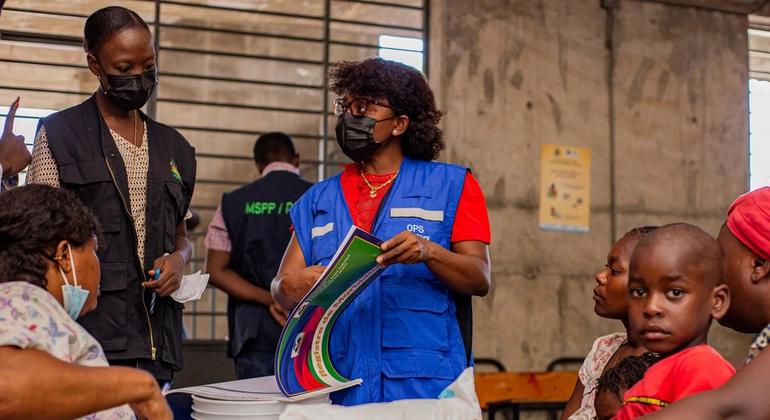Crisis in Haiti: Displacement and Hunger on the Rise
Over 700,000 individuals are currently displaced in Haiti, with children comprising more than half of those affected. Recent violence in the Haitian capital, Port-au-Prince, has forced an additional 12,000 people to flee their homes in recent weeks.
Food insecurity has reached catastrophic levels, impacting nearly half of Haiti’s population, or approximately 5.4 million people.
Alarming Signs of Famine
“For the first time since 2022, some areas where displaced populations are living are showing famine-like conditions,” said Associate Spokesperson Stephanie Tremblay.
Despite these escalating challenges, humanitarian efforts continue. In the first half of 2024, UN agencies and partners provided assistance to approximately 1.9 million people, with aid ranging from food to cash distributions.
Since late February, thousands of hot meals and hundreds of thousands of gallons of clean water have been distributed to displaced individuals in Port-au-Prince.
To address Haiti’s worsening crisis, a $684 million Humanitarian Needs and Response Plan has been initiated. However, it is currently only 43% funded, creating an urgent need for additional support.
—
Samoa’s Struggle Against Plastic Pollution
Samoa, like other small Pacific Island nations, is grappling with a rising tide of plastic waste, according to independent rights expert Marcos Orellana.
Although Samoa has taken steps to ban certain plastics, Orellana warned that the country cannot manage the growing influx of waste. He emphasized that Samoa is often forced to deal with imported cheap plastics, banned pesticides, used cars, and tires—waste it lacks the financial, technical, and human resources to process adequately.
The expert criticized global plastic producers for failing to address pollution at its source. He also expressed concern over the direction of international negotiations on a legally binding agreement to combat plastic pollution. Orellana said these talks risk shifting responsibility from wealthy, plastic-producing nations to developing countries like Samoa, which lack the capacity to tackle the plastic crisis.
—
Ukraine: Supporting Frontline Bakeries Amidst War
Amid the ongoing conflict in Ukraine, the UN World Food Programme (WFP) is delivering $870,000 worth of equipment to bolster small bakeries near the frontlines of the war with Russia.
In collaboration with local food producers, WFP distributed over 500,000 loaves of bread in September alone to communities affected by the war. More than 80% of WFP’s food assistance in Ukraine is sourced locally, supporting regional economies.
The latest equipment deliveries—set to benefit 14 bakeries across Mykolaiv, Kherson, Donetsk, Dnipropetrovsk, Zaporizhzhia, and Kharkiv regions—include industrial generators, rotary ovens, dough kneading machines, and other vital tools.
“Bread is the lifeblood of Ukrainians. Small bakeries in frontline regions have faced immense challenges due to the war and energy shortages,” said Richard Ragan, WFP Country Director in Ukraine. “This equipment will not only support local businesses but also ensure people have access to fresh bread throughout the harsh winter months.”
—
Mexico: Arbitrary Detention of Indigenous Rights Defenders
UN independent expert Mary Lawlor has raised alarm over the detention of indigenous human rights defenders in Mexico, many of whom face harsh sentences for peaceful efforts to safeguard their communities.
Lawlor cited numerous cases where defenders were subjected to flawed judicial processes and accused of crimes such as murder—even when evidence showed they were not present at the crime scene. Among these cases is Zapotec leader Pablo López Alavez, who has been detained for 14 years without a formal sentence. In 2017, the UN Working Group on Arbitrary Detention determined his detention to be arbitrary.
The combined sentences of nine other defenders total nearly 300 years. Lawlor condemned what she called the “misuse of criminal law” to suppress indigenous leaders’ efforts to protect their land and communities, which are often targeted for exploitation of natural resources.
Community Impact
Lawlor argued that criminalizing these defenders harms not only the individuals themselves but also the broader security and wellbeing of their communities.
While she welcomed the recent revocation of David Hernández Salazar’s sentence, Lawlor noted that his and similar cases reveal the fabricated nature of charges against indigenous leaders.
She called on Mexican authorities to release Pablo López Alavez and drop charges against other detained defenders. “I urge the competent authorities to revoke these sentences and release these individuals immediately,” she stated.
The Special Rapporteur, who does not represent the UN or any government, confirmed that she is in communication with Mexican officials regarding these concerns.














Leave a Reply